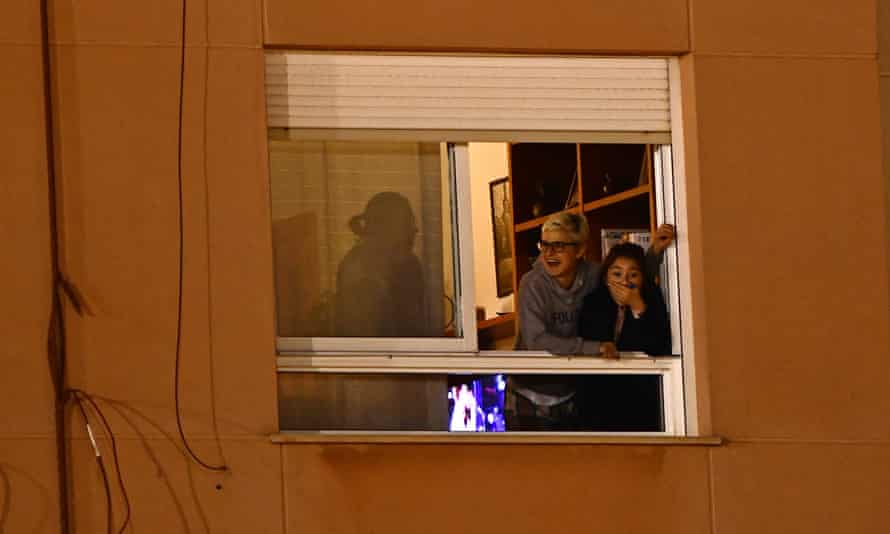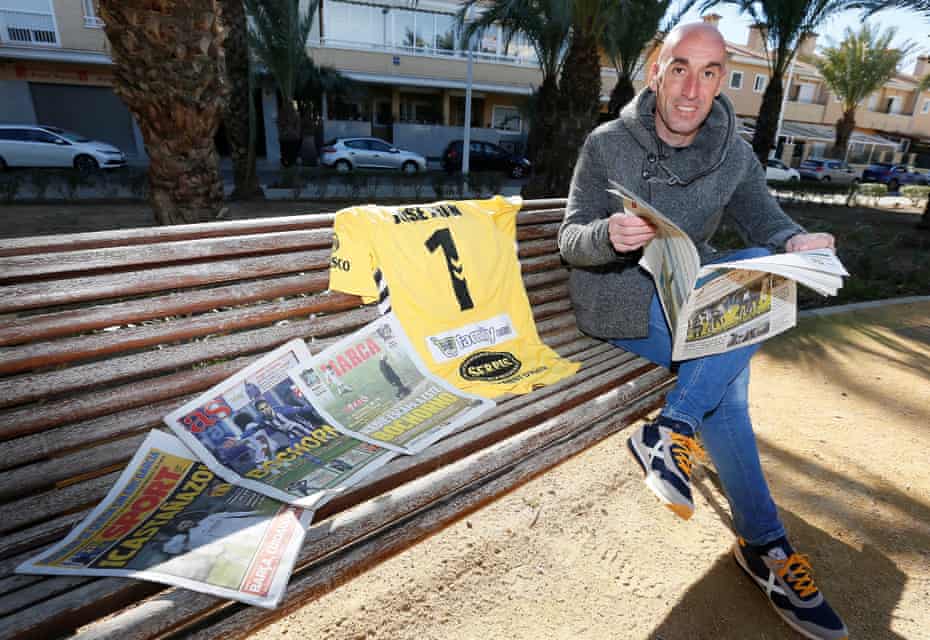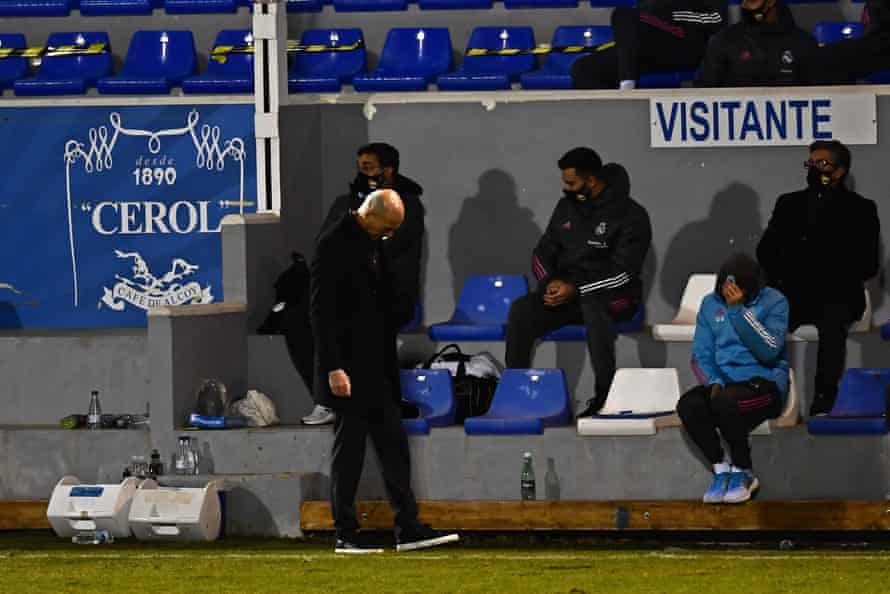“Javi Antón is crying,” said Vicente Parras, and he wasn’t the only one. The manager of Club Deportivo Alcoyano looked across the pitch at El Callao with its whitewashed walls, “Morale” splashed alongside the little blue door in the corner and saw his players still on the grass long after the final whistle. Some of them held white shirts, most of them held phones. “They’re all out there calling home,” he said: endless messages and dozens of conversations starting the way his had a few minutes before. Parras’s son couldn’t come to the game; no one could. “I just wanted to make sure he had seen it,” he admitted.
Not all of them had. José Juan Figueiras’s wife and his daughter were in tears when he called overwhelmed by it all, but his five-year-old son was in bed, asleep. It was late and he had school tomorrow; he’d have to find out what had happened in the morning, just what his dad had done, why everyone was suddenly talking about him. What had happened was this: tiny Alcoyano, the club that had not been in the first division for 70 years and were now in the semi-professional third tier with its 102 teams and 10 groups, had just beaten the biggest of them all, knocking Real Madrid out of the Copa del Rey. With 10 men, no fans and in extra-time.
At last, the legend had been fulfilled. Más moral que el Alcoyano, the phrase runs and it is one that goes well beyond football to become a popular saying: more morale than Alcoyano. Any time someone took on the impossible, whenever they refused to accept the inevitable, determined not to give up however hopeless, however absurd, any time they believed they could do something that, let’s face it, they couldn’t, they’d be told they had more morale, fight, spirit or faith than Alcoyano – the benchmark for belief.
No one really knows for sure where its origins lie, but probably some time in the 1940s when they went from regional football to the first division in five years, finishing ahead of Madrid in 1947-48, the only season they survived in the top flight. Or the early-1950s when they were last there but when they also beat Madrid. There’s talk of an era of wild games when anything could happen, matches always finishing 5-4 or 4-5. Of a victory over Athletic Club after a 3-3 draw at San Mamés. There’s a story too about a play-off against Espanyol in 1943 when they were losing 7-1 and players surrounded the referee demanding more added time because they could still do this. There’s also a suggestion of an attempted fightback at 13-0 down once, although it’s not certain that game even took place.
This one did, the evidence on tape, and it was almost as absurd: the happiest night in the life of what, right now, might be the saddest city in Spain. Alcoy is isolated, everything shut. According to El Mundo, a care home there has been closed after 73 of its 139 residents died, and that’s representative of something bigger and even more concerning. Alcoy has the highest coronavirus rate in the country, 2,402 cases per 100,000. The football team had not avoided the impact, either: in October they had been put in quarantine, games cancelled.
Sign up to The Recap, our weekly email of editors’ picks
Here, at last was some hope, or at least a distraction. “There is no better medicine than Madrid coming,” the coach said, yet few were likely to see them. Hopes that even 150 might be able to go to the ground, which holds 4,850, went unfulfilled. Denied gate receipts – salvation at this level – Alcoyano sold commemorative, symbolic tickets signed by the squad, more historic, more valuable now than anyone dared imagine. The club’s president and secretary could not go: they had both tested positive. The mayor didn’t attend either, to set an example, and nor did anyone else. There was a call to chant the team’s name from balconies at kick-off time and some flags went up, but history was made before a handful of journalists, a few alcoyanos in flats nearby and some lads perched precariously on a wall.

When José Juan left the house on Wednesday afternoon, he bade farewell with: “Let’s see how it goes.” Hours later, he told Cadena Ser radio: “And look how it went.” One-nil down to Éder Militão’s header, Alcoyano barely saw the ball – possession was down below 20% and the shot count read 5-25 – but with 10 minutes to go, defender José Solbes equalised from a corner to take the game into extra-time. As the players gathered, someone joked they’d need to get the paperwork to justify that they were out after the 10pm curfew and everyone laughed. No one had thought of that before; no one had imagined this, a miracle already.
With five minutes left, exhausted and down to 10 after the sending off of Ramón Lopez, with penalties looming if they were lucky enough to get that far, something extraordinary happened. Madrid were deep in their area. Then, suddenly, the ball was clear and they were up and running. A wonderful counter-attack took them up the other end. There, Juanan Casanova, scored the winner. The same Juanan who, gripped by cramp, could barely move, but who before the game had announced: “If I score, it will be the absolute business.”
He did. And it was.
ALCOYANO GO 2-1 UP ON REAL MADRID! 😱😱😱
The Segunda B side are down to 10-men and just a few extra time minutes away from knocking Zidane's side out of the Copa del Rey! 👀 pic.twitter.com/MXYgrhLi1a
— Premier Sports 📺 (@PremierSportsTV) January 20, 2021
When the ball went in, there was an incredulous smile on Zinedine Zidane’s face. Madrid had one man more than Alcoyano and the men they had included Karim Benzema, Toni Kroos, Eden Hazard, Casemiro and Marco Asensio, those he trusted to avoid exactly this fate. “This is unbelievable,” José Juan said, not so much David against Goliath as David against Goliath, Goliath’s big brother and all his mates, all of whom are nails. Alcoyano’s entire annual budget is a little more than €700,000. What Madrid paid for Álvaro Odriozola alone could keep them going for 42 years. The four subs Madrid sent on cost 317 times that. .
These are different worlds, colliding for one night, a certain purity prevailing. Alcoy’s winning goalscorer Juanan sidled up to Kroos at a corner and told him he liked him and asked if he could have his shirt. Juli Cerdá had been asked by his son to get Luka Modric’s. Alcoy’s hero was goalkeeper José Juan. He is 41. No one older has ever beaten Madrid in the cup, and he is three years ahead of anyone else. His career stretches back to last century and takes in just 27 first division minutes, in which the first thing he did was pick the ball out of the net, having come on as a sub for Celta Vigo against Racing Santander. Apart from that there are six games sitting on the bench, watching. On one of those days, he watched Ronaldo, Luis Figo, David Beckham, Raúl, Roberto Carlos and Zidane, unable to actually get near them.
Now he had. “Look what we’ve gone and done,” he said afterwards.

A lot of damage, for a start. This was the fourth time Madrid have been knocked out by a Second Division B team on the pitch and it might even be the worst of them. Asked if this was a disgrace, something to be ashamed of, Zidane replied: “That’s your word, not mine.” It was just about everyone’s. That and others like it, as if the press was all on the same page of the thesaurus. “No one escapes this embarrassment,” said the front of Marca, the coach striding centre stage. AS went for the same word: “embarrassment”, calling this “another stain on Madrid’s history”. It was, said El Mundo, “a shameful Madrid”. “Humiliation,” cheered El Mundo Deportivo, enjoying this immensely. “Real failure,” they called it, claiming Madrid had hit “rock bottom”. They had been ridiculed, Sport gloated.
Describing this as “one of the blackest nights in memory” and calling it a “crisis”, Marca asked whether it might be a decisive blow to Zidane. Madrid have won just one of their last five games and have seen two trophies slip through their hands in a week after getting knocked out of the Super Cup. It is made worse by the timing: on the morning of the game, Madrid awoke to news that Martin Ødegaard wants to leave, another young player not integrated into the team, another source of tension between coach and club. Last weekend, Luka Jovic returned to Germany and scored more goals in 27 minutes than in a year and a half at Madrid. Zidane’s praetorian guard protects him, but the president resents that too. And meanwhile, the coach’s grip on the dressing room and the fans loosens a little.
“We don’t like to lose but we’re not going to go mad,” Zidane said, speaking only for himself. “I accept responsibility and what has to happen will happen. When you lose, there’s talk.”

When you win there is too, or there should be. Particularly when you’re the team that wins like that against a team like Madrid. “I cried. This is incredible. A thousand things had to fall into place for this to happen and they did.” Juanan insisted. Alcoyano’s president admitted there were no win bonuses, because no one had thought they could win. “For a moment people in Alcoy have been able to cheer us on, even if from home,” Juli said. “We’re up in the clouds right now; we won’t realise what we’ve done for four or five days,” Juan José added. “These things happen once in a lifetime, if that.”
“The club, the city and the fans deserve it because they’ve been through such a bad time. Down in the mud, football has these things,” Vicente Parras said, looking beyond the empty stands and across the pitch where his players were still trying to take it in, calling home to make sure families and friends, stuck indoors like the rest of the city, had seen it, sharing the moment with them. “You want to know what más moral que el Alcoyano is?” he asked. “It’s this.”
from Football | The Guardian https://ift.tt/3p5OgMQ
via IFTTT

No Comment